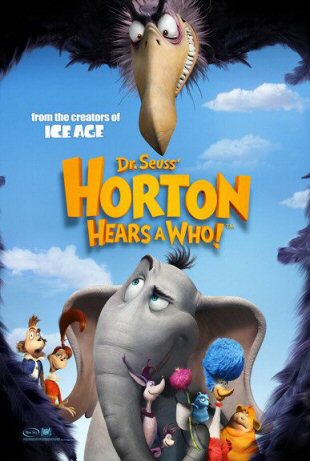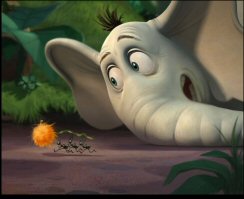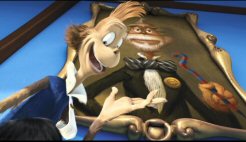Horton
Hears A Who
An elephant may be faithful one hundred
percent, but when adapting a short children's story to the
big screen, a writer simply can't be. Twice before the works
of Dr. Seuss have been stretched out into full-length features,
wrenching the Grinch and shatting on the Cat in the Hat.
Apparently after that last one, Seuss' widow swore that
no more live-action films would be made of her husband's
work. From here on out, it would be animation.
Of course, it wasn't the medium so much
as bad writing that caused the earlier problems. When Blue
Sky Studios, the people behind the Ice Age films
took on Horton Hears A Who, they did the wisest thing
they could - made sure their story expansions were within
Seuss' original narrative. Ken Daurio and Cinco Paul hang
everything new on Seuss' already substantial skeleton, mostly
filling in the details of life in Who-ville, while the titular
elephant suffers the same trials Seuss envisioned.
The result honors not just Seuss' book,
but his overall outlook. Throughout, Horton references back
to his original story, Horton Hatches the Egg, by
sticking to his motto, "I meant what I said, I said what
I meant, an elephant's faithful one hundred percent." Ignoring
the obvious peril to their world, the government of Whoville
seems suspiciously familiar, and if you think Seuss wouldn't
have drawn such a connection, then you've obviously never
read The Lorax. Seuss was political; the source material
here was written as a metaphor for why Americans needed
to support the Marshall Plan.
In transferring to the screen, the film
also takes on a few more messages, such as the need for
forgiveness and reconciliation. Sixty years or so after
it was written, this silly little story about an elephant
has a lot of unexpected depth.
But is it funny?
Kids
won't care about its history or its message. They'll be
too busy laughing. Not only are the Whos often ridiculous,
but Horton himself has been given a more vivid imagination.
This allows the filmmakers to more directly pay tribute
to Seuss in a 2-D animation sequence that looks just like
the author's sketches come to life. (If you look closely,
too, you'll catch Seuss portrayed as a former Mayor of Whoville.)
Horton
also apparently watches anime, and his illusionary fight
scene incorporates more than one style of Japanese animation,
yet all completely in service to the story.
Several "hip" comics also pop up throughout
the film, yet none of them, including Jim Carrey as Horton,
distract from the story. Though Seth Rogen and Jonah Hill
play little more than cleaned-up versions of their usual
personas, their voices fit the characters they've been given.
The usually smarmy Will Arnett subsumes his voice into that
of the villainous vulture Vlad; in fact, he's almost unrecognizable.
Carrey, too, serves the story, playing
with a cartoony voice but one that stays consistent. Horton
may have a vivid imagination, but the character is earnest,
not vocally talented. The same can be said for Steve Carell
as the current Mayor of Whoville; both actors utilize their
talents, not their star power.
In a nice touch, directors Jimmy Hayward
and Steve Martino go back to one of the best comediennes
of our time, giving Carol Burnett a plum role as the kangaroo
who rules the jungle.
Taken all together, Horton Hears a Who
stands up to watching more than once, with morals delivered
so charmingly that you almost don't realize you've been
schooled. As a guy going through the Dr. Seuss canon with
his own kids right now, I can say with some authority that
that's just how the Doctor would have done it.
|








